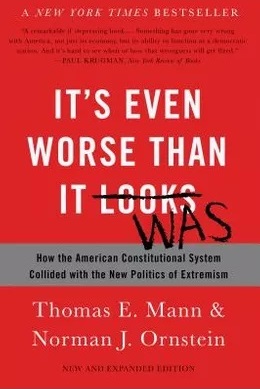Book Review: It’s Even Worse Than You Possibly Could Have Imagined

I just finished this quick read – It’s Even Worse Than It Looks, by Thomas E. Mann and Norman J. Ornstein. Here’s my review on goodreads:
The Boomer generation is one whose scholars and thinkers (and they are a thinking generation rather than a doing generation) tend towards pessimistic outlooks and dire prognostications. They are also the most politically destructive generation in living memory. The destructiveness the Boomers have wrought in American government is the subject of “It’s Even Worse Than It Looks”, a collaboration by two of their own cohorts. While the book isn’t explicitly generational history, the story it tells, of government becoming increasingly partisan and conflict-oriented rather than coalitional and achievement-oriented, clearly coincides with the Boomers’ rise to political power.
The authors trace the beginnings of this trend all the way back to 1978, when Newt Gingrich first took office in the House of Representatives. Before reading this book, I had not realized how far back the inception of the Gingrich Revolution was, or how long it took to come to fruition. It was predicated on a strategy of confrontation and disruption, and of questioning the legitimacy of existing institutions: the Boomer modus operandi since the days of the student movements of the 1960s. By the time of the Obama administration, when this book was first published, the strategy enabled a Republican minority to hold the United States government hostage.
The fundamental problem which Mann and Ornstein diagnose is that parliamentary style political parties do not mesh well with a system of separate branches with checks and balances. A minority party can easily exploit one branch’s power to limit another’s and prevent any governing from happening at all. This suits the ideology of the Republican party, which holds that government is actually undesirable altogether, and their asymmetric use of this strategem against the Democratic party has defined politics in the United States in our time. Generation X politicians in the GOP, like the “Young Guns” of the 2008 election cycle, have been happy to take up the banner of obstructionism in the name of anti-government principles. This alliance between Boomer and Gen X conservatives has wielded considerable power, and clearly marks a generational shift in U.S. politics.
Again, the authors don’t explicitly make a generational point. What they do is break down the problem in terms of specific factors and offer some possible remedies. Foremost is improving voter participation and shifting away from winner-take-all electoral processes, which prevent moderate politicians from winning elections. Campaign finance reform is another possible remedy at the electoral level. At the institutional level, reducing the use of the filibuster to obstruct legislation and executive nominations is key. Finally, improving the culture overall is required, to restore public trust and recreate a sense of public space.
The authors released an edition in 2016 with the title updated to “It’s Even Worse Than It Was”; this is the edition I read. In the afterword, Mann and Ornstein acknowledge that nothing improved since 2011, that all the trends of hyperpartisanship and extremism and lack of compromise have worsened. And this was before Trump won the election; I can only guess that a third edition published now would be titled “It’s Even Worse Than You Possibly Could Have Imagined”. The disastrous inability of the government to address the Covid-19 pandemic clearly demonstrates the damage that the insurgent Republican party has done to our political system.
Overall this book is a quick and easy read, and an eye-opening work of political analysis. It explains the changes that have occurred in government since Boomers and Gen Xers have come to dominate in office, and how the confrontational style of parliamentary politics has rendered our constitutional system dysfunctional. It understands that restoring the functioning “normality” of the past, with parties that are adversarial but able to work together, will be difficult. Informed by generational theory, we must recognize that it will take future generations of politicians to get us there.
I’ll just add that, despite the pessimistic title I gave to this blog post, I feel like we might soon be over with this period of hyperpartisanship. I think the worst of the extremists are being discredited, and are being marginalized in the public sphere. Trump’s hopes of a coup of some sort are fading, and Trump supporters are heading for the shadows.
Obviously a lot is riding on the transition to the Biden administration and its first few months. Like all of us, I will watching intently to see if it finally starts getting better.
2 thoughts on “Book Review: It’s Even Worse Than You Possibly Could Have Imagined”